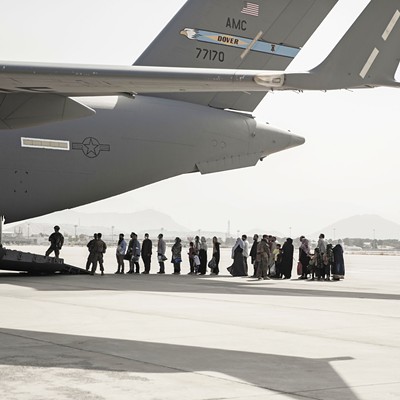Two U.S. soldiers died in Iraq this week. Their deaths are so recent that their names and the details of their deaths have yet to be made known publicly. But a man in Hope, Idaho, already has flags to honor their service.
Mike Ehredt, who retired last fall from a career in the U.S. Postal Service, is just days away from launching an epic, six-month journey of mourning and remembrance. Beginning on May 1 in Astoria, Oregon, he will begin a solo run of more than 4,000 miles across the country to the shores of the Atlantic Ocean in Maine, stopping every mile to plant a flag in honor of an American soldier who died in Iraq.
The two as-yet-unknown soldiers killed this week bring the American death toll in Iraq to 4,392.
Barring any more casualties in the coming days, they will be the first flags that Ehredt will place along the roadways on his quest, as he runs through the casualty list in descending order.
Marine Maj. Jay Thomas Aubin of Waterville, Maine, listed as the first American to die in Iraq, will be honored by the last flag that Ehredt will plant in the ground. Serendipitously, it will be placed in Aubin’s home state (and not far from his hometown) near the shore at Rockland.
The completed line of memorial flags, spaced every mile from coast to coast, is intended to symbolize soldiers linked arm-in-arm in an unbroken chain across the nation, Ehredt says.
The idea first came to him three years ago, when he was postmaster at Crested Butte, Colo.
“I was reading obituaries in the Denver Post — they did obituaries that were like feature stories,” on soldiers who died in Iraq, he says. Ehredt is a veteran of the Cold War army of the late 1970s. He was stationed in Germany in a front-line combat engineering battalion arrayed near the East German border.
If the massed Soviet armor columns ever punched through, he says, “We were supposed to be a speed bump.”
An extreme athlete for many years, his own dream was to pull off a coast-to-coast endeavor.
“I wanted to do it for 30 years,” Ehredt says, increasingly feeling that time was running short. If he did it just to do it, he says, “I’d probably get halfway through and say, ‘I’ve seen enough of the country,’ and not go on.
“I wanted to have another reason to do it.”
So he decided to make it a war memorial of sorts and has been planning the complicated logistics for the last several years.
He has planned a 4,522-mile route, leaving room for increases in the casualty totals and has assembled 4,400 small U.S. flags with handwritten notes naming each soldier with details of their deaths and hometowns.
He has loaded all the names into a Website, Projectamericarun.com, and will activate GPS coordinates as each flag is planted.
Ehredt will be running nearly 30 miles a day over eight hours and has made advance arrangements to stay with residents of towns and cities along the way. He wants to meet people, he says. He wants to share stories.
The reality of the all-volunteer military means many soldiers come from rural America where jobs are scarce and a significant number of the war dead are small-town kids. On several nights, he will be staying with families of these fallen soldiers.
“Astoria has Gold Star families for six service members who have passed,” Ehredt says, and a delegation of the surviving family members will accompany him as he crosses the mile-long bridge connecting Astoria to Washington’s remote southwest corner on the initial leg of the trip.





















